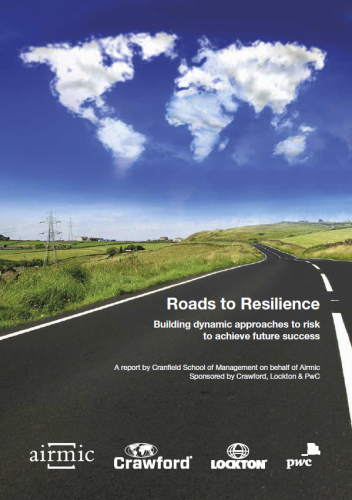Roads to Resilience - executive summary
Introduction
“How can businesses ensure their future successagainst the growing array of risks?”
To answer this key question, Cranfield School of Management and Airmic studied a number of leading organisations that have managed to create a resilient culturein order to protect their business, brand and reputation. 'Roads to Resilience’ follows the highly acclaimed ‘Roads to Ruin’ report, published by Airmic in 2011. This looked at high-profile crises involving 23 companies, which left their reputations in tatters. The main objective of this new report is to help companies avoid corporate catastrophe by learning from those who are leading the way in creating resilient organisations.
For boards, the incentive to become resilient goes well beyond merely avoiding disaster. Companies that are confident in their risk management have the confidence to be more enterprising and entrepreneurial, thereby not only identifying risks but also seizing opportunities. The research found that the qualities embedded in resilient organisations enable them to succeed in other respects. They are more responsive to their customers and the markets they serve, their staff and suppliers are motivated and loyal, they gain trust by being more dependable and achieve better results for shareholders. In short, resilience should be at the heart of strategy and part of the overall vision of every organisation. Resilience enables organisations to deal more effectively with both expected risks and the unexpected ones.
Cranfield researchers interviewed executives, management and staff with risk management responsibilities, including CEOs, at eight chosen organisations. They found overwhelmingly that the key to achieving resilience is to focus on behaviour and culture. This may involve fundamentally re-thinking and challenging prevailing attitudes towards risk. Traditional risk management techniques, whilst essential, do not in themselves create a culture of resilience.
“You’ve got to have the right culture; otherwise you’re never going to embed anything. Nobody’s going to do the training, nobody’s going to put it on their personal agenda and talk about it, the networks aren’t going to happen, the network is where your culture lives” (SVP, Head of Global Risk Management, IHG).
“It has got to start at the top of the organisation, with supportive language that shows we are more interested in how we learn and move forward, than holding an individual accountable” (CEO, UK General Insurance, Zurich).
- Fill out an application Our membership manager will assess your eligibility against our criteria.
- Complete your profileIf you are eligible for membership you will be asked to answer a few questions about yourself.
- PaymentYou can make payment online using a card or request an invoice.

